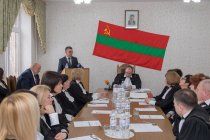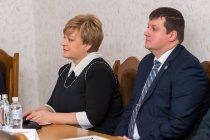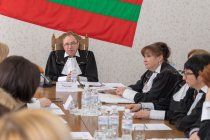 Русский
Русский English
English-







Guarding Justice
The Plenum of the Supreme Court of the PMR was held. The results of the work of courts of different instances in the past year were summed up. The President of the Republic Vadim Krasnoselsky, the Chairman of the Supreme Court Vladimir Rymar, Deputy Chairman of the Supreme Council, head of the parliamentary committee on legislation, defense, security, peacekeeping activities, law enforcement agencies, protection of the rights and freedoms of citizens of the city and district courts among the participants of the plenum.
By tradition, there were two reports - on the work of the judiciary in civil and criminal matters. The information was delivered by the Vice-Chairmen of the Supreme Court Elena Polozova and Natalya Vlasenko. Citizens still trust the judicial community, and see in the courts the defenders of their rights and interests. This is evidenced by statistics. 18,822 civil and 1,138 criminal cases were in court in 2018. The courts received 17208 civil cases, which is 2280 more than the previous one. A third of them is the Tiraspol City Court. The largest number of civil litigation cases fell on debt collection of utility bills and utility bills. The load on one judge was 345 civil cases.
Last year, the Civil Affairs Board paid special attention in its activities to monitoring the work of the city and district courts, and, above all, unreasonable delay in the timing of cases.
As for criminal proceedings, 244 people were convicted in the past year more than in 2017, 21 defendants (1.2%) were acquitted, 520 people were conditionally convicted.
Representatives of the judicial branch, the President, and the Prosecutor of the Republic took part in the discussion following the reports. Topics are also traditional - the timing of cases, the functioning of the institution of parole, acquittals, private definitions addressed to the investigating authorities, etc.
The Pridnestrovian prosecutor Anatoly Guretsky drew the attention of the participants of the plenary session to the changes in the law last year, which returned to the supervisory authority the previous powers, including the maintenance of state charges in the courts.
Anatoly Guretsky also said that the Prosecutor’s Office sent a new legislative initiative to the Supreme Council to amend the Civil Procedure Code regarding the consideration of cases in the supervisory authority.
The discussion of the issue of implementing the parole mechanism was of particular interest among the participants of the plenary session. According to President Vadim Krasnoselsky, who was supported by the head of the Supreme Court, the State Service for the Execution of Sentences should play a big role in presenting candidates for parole of prisoners. 139 of 145 materials sent to the courts for parole were prepared by lawyers of convicts. The courts granted 44 petitions.
Speaking to the participants of the plenum of the Supreme Court, Vadim Krasnoselsky noted the positive dynamics of reducing the time taken to cases in courts, reducing the number of complaints coming to the Presidential Administration, the work of judicial bodies, expressed satisfaction with their work and thanked the justice administering people.




